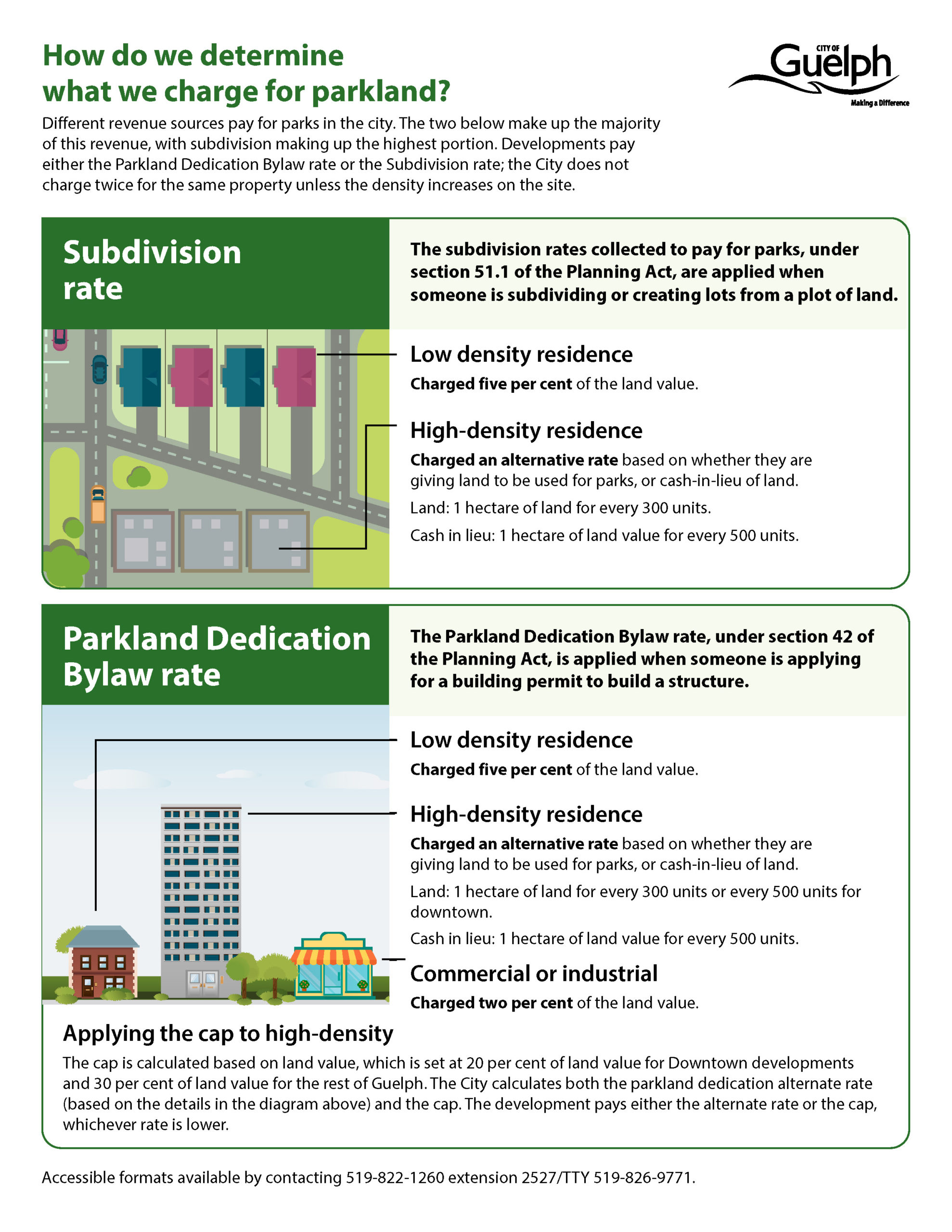On this page
Guelph is growing and the way people use parks is changing. It’s important we plan Guelph’s park system to provide optimal services as our population grows and changes. We will need to use our land more efficiently, expand our park system and reshape our spaces to accommodate outdoor recreation.
One way our park system will grow is through development. We use a Parkland Dedication Bylaw and Official Plan policies allowed by the Ontario Planning Act to require planning and development applications to transfer land to us for parks and public recreation or provide cash-in-lieu of parkland so parks or recreational spaces can be purchased.
Changes to legislation require municipalities in Ontario, including ours, to review our Parkland Dedication Bylaw in order to continue using the “alternative rate” from subsection 42(3) of the Planning Act. The alternative rate used by the City calculates parkland dedication that can lead to higher land dedication and/or cash-in-lieu of parkland.
How we determine what we charge for parkland

Establishing Guelph’s parkland needs – now and in the future
Guelph Park Plan: Guiding our future parkland system
Our approved Park Plan helps assess the current park system and determine our future land needs as Guelph grows. The Park Plan ensures we have an optimal level of service for parks that is accessible to all residents as we grow—this is the amount and type of service that meets community needs/desires and is sustainable, affordable and realistic.
The Park Plan is part of the Parks and Recreation Master Plan (PRMP) and will be used to address time-sensitive legislative changes to the Parkland Dedication Bylaw required before September 2022. The final plan will be re-integrated into the PRMP as a part of its delivery to Council in 2023.
It’s important to recognize that parkland dedication alone will not achieve Guelph’s Official Plan parkland targets. The larger PRMP will explore creative solutions to address those goals.
The Park Plan:
- Defines our park system to understand our existing conditions
- Outlines future challenges and opportunities facing our park system
- Plans for an optimal level of service as our community grows and changes
- Develops strategic directions for parkland retention, optimization and expansion
We need a Park Plan in order to update our policies and priorities in line with the City’s Strategic Plan and to take advantage of new approaches, legislation, trends and guidelines in park planning and development.
Have your say
Attend a virtual workshop
We hosted two facilitated virtual meetings open to the public to provide information about the project and to ask the community about their park experiences and needs.
Timeline
Quarter 4, 2021
- Background review and parkland analysis
Quarter 1, 2022
- Community engagement for Park Plan
- Draft Park Plan
- Community engagement for Parkland Dedication Bylaw
Quarter 2, 2022
- March 24, Park Plan report goes live on guelph.ca/council
- March 31, Parkland Dedication Bylaw report goes live on guelph.ca/council
- April 4, Committee of the Whole meeting for the Park Plan
- April 25, Council meeting for the Park Plan
- Council workshop on Parkland Dedication Bylaw
- April 13, special meeting of Council for consideration of Parkland Dedication Bylaw
Quarter 3, 2022
- July 18, Parkland dedication Bylaw passage
Key documents
- Info sheet: How do we determine what we charge for parkland?
- Presentation slides: Understanding the Parkland Dedication By-law (PDBL) Update (June 2022)
- Draft Parkland Dedication Bylaw 2022
- Understanding the Parkland Dedication Bylaw (Questions and Answers)
- Draft Park PlanPark Plan engagement summary (January 2022)
- Park Plan Developers Focus Group summary (January 13, 2022)
- Park Plan Public Focus Group summary (January 12 and 13, 2022)
- Park Plan engagement questions and answers (January 12 & 13, 2022)
For more information
Mallory Lemon, Park Planner
Park and Trail Development, Parks
City of Guelph
519-822-1260 extension 3560
[email protected]
